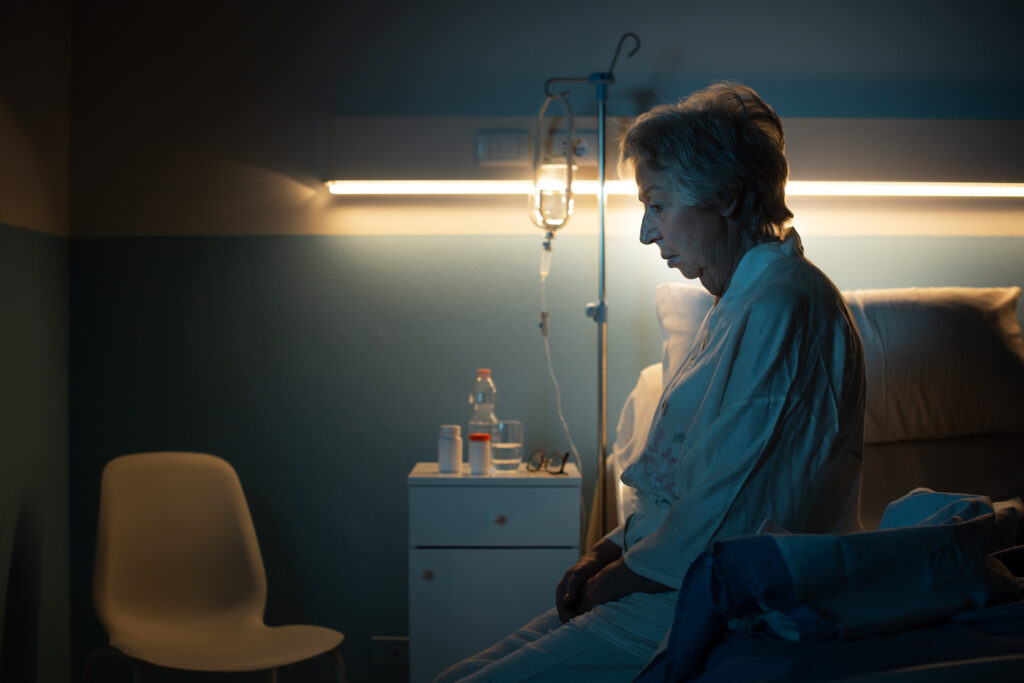I find the term “medical aid in dying” (MAID) deeply pernicious. It is not only an assault on human dignity (which it implicitly claims to defend), but it also employs a rhetorical sleight of hand. The term conjures up an image of someone who is already dying of a painful and terrible disease, and the aid they receive seems good and possibly even heroic. So I will switch from the misleading term “medical aid in dying” and now speak of “physician-assisted killing,” or PAK.
These misleading ideas associated with MAID have taken a firm hold of the Canadian imagination. According to a poll from Research Co., a representative sample of Canadians were asked the following question: “At this point, only an adult with a grievous and irremediable medical condition can seek medical assistance in dying in Canada. Do you agree or disagree with allowing adults in Canada to seek medical assistance in dying because of the following reasons?”
When asked about “Disability,” a full 50 percent of Canadians agreed that someone should be able to seek PAK. When breaking down the results by age groups, one might expect to find that younger folks, more attuned as they are to the nefarious effects of structural coercion, would be less likely to support PAK in the case of disability. But the opposite turned out to be the case: for 18- to 34-year-olds, support actually jumped ten points to 60 percent. In other words, 6 in 10 of young Canadians support PAK as a response to disability.
What about poverty? A lower number of Canadians—27 percent—think of it as a reason someone should be able to pursue PAK. But once again the numbers for young people are remarkable and disturbing: 41 percent of Canadians aged 18 to 34 believe it can be a legitimate reason to request PAK.
Start your day with Public Discourse
Sign up and get our daily essays sent straight to your inbox.How did Canada get here? Is the United States headed down this same path? If so, how can Americans reverse course?
PAK in America vs. Canada
As families and local communities have frayed, we no longer have a ready-to-hand idea of what a good death might be apart from PAK. The dying process has been outsourced to massive, impersonal housing projects that build sterile nursing homes underwritten by vulture capitalists who discovered they can get rich on our inability to deal with death. So, to the extent that PAK gives both the dying and their families an alternative to the horror show of dying alone (except for maybe the company of a robot) in totally inadequate “care homes,” it becomes quite attractive, and pro-lifers face a serious challenge in resisting it.
Effective resistance to PAK in America has focused largely on slippery slope arguments that emphasize what happens after you open the door to this practice. If those with terminal illness can seek death, why not those with disabilities, or those suffering from severe mental illnesses? PAK opponents, in other words, are focusing on things that invoke discomfort and even anger. But will this be enough in the long run?
If those with terminal illness can seek death, why not those with disabilities, or those suffering from severe mental illnesses?
Nothing has bolstered this strategy for PAK opponents in the United States more than pointing to what is happening in Canada, whose program has expanded in ways that invoke less a slippery slope, and more a free fall accelerating at 9.8 meters per second squared. Consider that it was only five short years ago that Canada legalized PAK. And as we’ve seen, the law has recently enabled killing the poor and the disabled precisely because they are poor and disabled.
This gold-standard reporting from The New Atlantis earlier this year clearly demonstrates the extent of the horrors of Canada’s program. The program trains those who administer death to expect patients who “choose” PAK due to lacking the support they need. In a kicker that is difficult to get out of one’s mind, the article explains the message that Canada sends to its vulnerable populations:
Just a few years ago they would have been textbook candidates for what a just society would say: Your life has value. In Canada today they hear something else: Your death will be beautiful.
But what kinds of situations are we talking about? In what kinds of cases are the powers that be in Canada telling people that they might be better off dead? Well, how about a veteran who asked for PTSD treatment? Or another veteran who asked that a wheelchair ramp be built into her home? Though neither was dying, in both cases they were asked if PAK would be a better option for them.
In another case, a woman with very severe chemical sensitivities “chose” PAK after she was denied public housing that wouldn’t trigger those sensitivities. Or how about a 63-year-old man who had been waiting for spinal fusion surgery for eighteen years, and bearing terrible pain during that time, saying “I am fed opioids and left to kill myself.” He requested PAK and was approved. And then there was the 44-year-old woman with a degenerative disease who, after being denied home healthcare, decided to be as direct as she could about what actually killed her:
Ultimately it was not a genetic disease that took me out, it was a system. There is desperate need for change. That is the sickness that causes so much suffering. Vulnerable people need help to survive. I could have had more time if I had more help.
The Toronto Star, the largest and most progressive newspaper in Canada, described the move toward these practices as “Hunger Games style social Darwinism.”
PAK and Post-Christianity
Opponents of PAK in the United States have pointed to the dystopia to the north of us, and so far their strategy seems successful: even in many blue states (especially out east), PAK is not legal. Yet why has Canada gone so far with PAK? Returning to the polling figures cited at the beginning of this essay, what are we to make of these numbers in a progressive country that has adopted a position so antithetical to how Americans understand social justice?
In Canada, killing the most vulnerable human beings comports well with a society that values giving individuals what they ask for (autonomy), and a just distribution of resources (equity) in ways that allow the most people to derive the greatest benefit from them (utilitarianism).
One reason is that progressivism in the United States has retained aspects of its Christian inheritance—with its focus on nonviolence, inherent and inalienable human dignity, and preference for the most vulnerable. Progressivism in secular Canada, especially among young Canadians, is by now far removed from these commitments. Thus, in Canada, killing the most vulnerable human beings comports well with a society that values giving individuals what they ask for (autonomy), and a just distribution of resources (equity) in ways that allow the most people to derive the greatest benefit from them (utilitarianism).
It doesn’t take a genius to point out the tensions here: equity very often conflicts with utility calculations, and the poor and disabled are some of the least autonomous human beings in our communities. But that doesn’t stop the secular state, and even secular academic bioethicists in both Canada and the United States, from attempting to muddle their way through with these incoherent values in play.
The fact that increased cultural distance from Christianity may have helped pave the way for Canada’s PAK regime is further suggested by what’s happened—and what has not happened—in the much more religious United States. While Oregon and Washington (two of the least Christian states) have had legal PAK for decades, it has only recently become legal in states like California and New Jersey. And despite the best efforts of groups like Compassion and Choices (formerly the Hemlock Society), PAK is still illegal in most of the country—including in deep blue states like New York, Connecticut, and Massachusetts, as noted earlier.
The arguments that have won the day in deep blue USA are—you guessed it—about the slippery slope of such laws and the effect that they will have on the poor and disabled. Unsurprisingly, the most effective advocates against such laws are disability rights advocates (and especially disabled people themselves) who point to the disturbing data about why people seek PAK. When physical pain doesn’t even make the top five reasons people in Oregon request PAK—but fear of loss of autonomy, fear of loss of enjoyable activities, and fear of being a burden on others do make the top five—this sends a very clear message to the disabled: it’s reasonable that someone like you would want to kill yourself. And in Canada, they take the next step: we think someone like you might want to take advantage of the legal right to kill yourself.
Going on Offense
Happily, disability rights activists are still winning the day, again, even in deep blue places on the east coast. But playing a strictly defensive game of knocking down legalization attempts—especially as the United States secularizes and becomes more like Canada—seems like an untenable strategy for protecting the most vulnerable from this deadly violence. Locking in the dignity and radical equality of all human beings will require more. In short, it is time to go on offense.
A broad and diverse coalition of folks is doing exactly that: seeking to make PAK unconstitutional and therefore permanently off the books in this country. The Euthanasia Prevention Coalition in the United States recently reported on a lawsuit filed in the State of California by the United Spinal Association, Not Dead Yet, Institute for Patients’ Rights, Communities Actively Living Independent and Free, Lonnie VanHook, and Ingrid Tischer. These plaintiffs are all organizations with members who have disabilities, individual persons with disabilities, and/or organizations that advocate for persons with disabilities.
The lawsuit has the goal of reaching the Supreme Court and overturning California’s law protecting physician-assisted killing. They argue that this law is unconstitutional because it treats suicidal persons with disabilities (which according to the Americans with Disabilities Act includes those with a terminal disease) differently from other kinds of suicidal persons. If the suicidal person does not have a disability, then the state of California protects her and restricts her ability to kill herself. But if the person has a disability, then California has a special set of discriminatory rules that imply that her life is worth less and (like Canada) even refuses care and supportive services in favor of steering her toward her death. This, the plaintiffs argue, is a violation of the Fourteenth Amendment’s Equal Protection and Due Process clauses.
In my view, this a brilliant strategy on multiple levels, aligning “conservative” pro-life human dignity concerns with “progressive” disability rights concerns in a way (to this non-lawyer’s mind, at least) that makes a powerful legal, moral, and rhetorical case against legalized PAK. Again, it is long past time for us to go on offense in this battle. And the horror show we see unfolding with our secular neighbors to the north indicates just how much is at stake if we lose.













